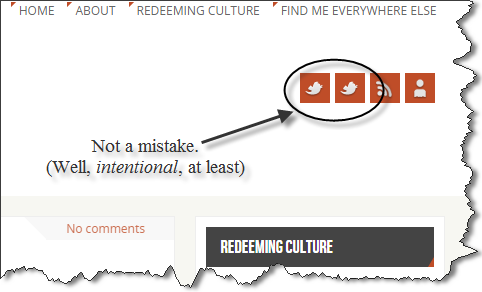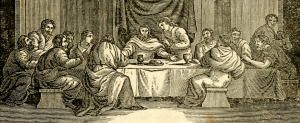 I don’t even know how to react to terrorist attacks anymore.
I don’t even know how to react to terrorist attacks anymore.
Even the attacks in Paris last fall made me speechless; I felt like I had to respond on Redeeming Culture, but my response was about the associated response to the refugee crisis, not about the attack itself. And the reason I’m writing here instead of on Redeeming Culture is that…I don’t think I have anything to say here, either. Other than the usual truths (I mourn and weep with those affected, I can’t understand the loss they’re going through, I hope that people meet Jesus through this), what is there to say? I don’t have any words.
Thankfully, Matt Walsh does. (Could you hear my eye roll there?)
Walsh published an article on The Blaze this afternoon that’s already getting some play on Facebook. And while I typically assume that Matt Walsh is a generally decent guy who amps up his outrage and removes his filter while writing to get clicks, this time I feel like he goes a little far.
Let’s start with the title.
First of all, Walsh calls his article “It’s Time To Stop Pretending All Religions Are Equal.”
I suppose you can see where that might get some angry response, but my problem with it isn’t what most people’s might be. I suppose in a way I agree with the statement, but not with how it’s used.
First, I agree that religions aren’t equal. Christ is truth, and so all others are lies in the face of His reality. And He is also infinitely valuable; that’s why repeated calls to “tone it down” or otherwise remove our faith from the core of our being (or the core of our interaction with others) are missing the point of our reality.
But to many Muslims, their faith is just as important as ours is to us. And if we want to reach their hearts with the truth of Jesus, denying that reality is folly. We cannot be surprised that someone who is not a Christian holds other beliefs more valuable than Christ; we cannot disparage their beliefs without losing the battle for their souls. Openly, wantonly, disrespectfully disparaging another’s pursuit of their passion, even if that passion is sinful or untrue, can do nothing but push them away. And if we hold them as God’s creation, needing the same Jesus we claim, we cannot risk that.
No, other religions aren’t equal. But the people who follow those religions ARE.
Diversity vs. Individuality
Walsh starts his piece from a point of sadness, but soon goes on the offensive against diversity.
Diversity is a strength, they tell me, but I have seen no evidence to support this doctrine. Diversity of thought might be a strength, but even then it is only a strength if the thought is rational and directed towards truth. The nonsensical thoughts of relativistic nincompoops are not valuable or helpful.
This sounds more like ravings than like truth. In fact, proof of diversity’s effectiveness has been established by several studies; in Scott Page’s 2006 book “The Difference: How the Power of Diversity Creates Better Groups, Firms, Schools, and Societies,” he details how a diverse group can be more productive than even a more technically proficient group at solving particularly difficult problems. The podcast “Reply All” recently chronicled his diversity research, as well as science writer Carl Zimmer’s medical evidence, in a recent episode about diversity in Silicon Valley.
And, to be sure, things that are “nonsensical” or “irrational” are unhelpful. But when Walsh uses those words in this context, he is clearly referring to leftward-leaning viewpoints; nothing objective or proven.
But in a strange reversal, Walsh trumpets the value of homogeneity in almost the same breath that he decries it. Immediately following the quote above, he says,
Similarly, racial and cultural diversity does not enrich us if we lose our identity in the process. When you throw a bunch of people with diametrically opposed beliefs and values and priorities into a food processor and hit frappe, you end up with a smoothie that tastes an awful lot like the collapse of western civilization and the rise of barbarians.
So which is it, Matt? Are we more at risk when we aren’t homogeneous, or when we’re not individually unique?
It’s a silly question to ask, especially since no one is asking anyone to give up their identity. Not even Walsh, who doesn’t mention the topic anywhere else in the article.
That said, his particular choice of threat may be rather apt; the barbarians. In fact, their destruction of a homogeneous, inward-focused Roman empire is uniquely prescient for our society.
The United States might just be the closest analogy in the modern world to the superpower that Rome was in its heyday, but we face the same problem they did: the inability to focus with any clarity on concerns of the marginalized, whether inside or outside our own borders. For Rome, that meant a drought which put their outlying provinces at risk of invaders, the individuality of their populace swallowed up in the homogeneity of the approaching Barbarian hordes. What threat faces us? What marginalized people might cause our downfall?
The Demonization of Islam
Of course, Walsh has an answer for that, too.
If Islam is a peaceful religion, why are Muslims literally the only people in the world setting bombs off in subway stations and airports and theaters and embassies and restaurants. Spin this anyway you like, but right now the global terrorism market is a Muslim monopoly. We are certain a terrorist attack was carried out by Muslims the moment the bomb explodes. Shouldn’t that tell you something?
This paragraph is clearly “begging the question,” but logical fallacies aside, it ignores a historical truth. Yes, there are evil Muslims in the world. Maybe a larger percentage of this group is evil than any other group in the world. I don’t have any numbers on that.
But five decades ago, there were more evil Soviets than any other group in the world. A century ago, there were more evil Germans and Japanese than any other group in the world. 250 years ago, it was Southern, slave-owning Americans. 500 years ago it was the Spaniards. Two millennia ago, it was the Romans. Centuries before that, it was the Egyptians. But in all of these cases, for every individual perpetrating violence, there was a large group of his kinsmen who didn’t. Why do we think that would be any different for Muslims?
Christians demonizing Muslims doesn’t solve any problems. At best, it pushes moderate Muslims away from ever meeting Jesus; at worst, it pushes less-moderate Muslims further into the same extremist camp the terrorists occupy.
The Danger of Fundamentalism?
Walsh doesn’t have much patience for this argument. He rails against those who would (erroneously) call terrorists “fundamentalist Muslims,” reminding his readers that fundamentalist Christians tend to perpetrate more good upon the world (which is true) while fundamentalist Muslims perpetrate more bad upon the world (which is not true). But then he notes that the word “fundamentalism” has come to be seen as the problem.
Liberals are fond of saying “fundamentalism” is the problem generally, as if living by your convictions is wrong regardless of the nature of your convictions. Such an idiotic notion can be expected from moral relativists who believe nothing to be fundamentally true, therefore anyone who adheres to any fundamental doctrine, no matter the doctrine, is dangerous.
Here, Walsh speaks the most truth—and in so doing, undermines the very point he’s trying to make.
See, fundamentalism and the close adherence to values is not evil. Not even when it’s wrong. In fact, it’s the fact that they hold their values very dear that actually makes Christians most like Muslims; and if we ever hope to reach them with the message of the Cross, it must be on that bridge.
Superiority and Fruit
Walsh does hide some truth about Christ and Christians in his article. Like this: “Christians, individually, are responsible for plenty of evil, but that evil is a result of their rejection of the truth of Christian doctrine. The more they reject it, the worse they are. The more they accept it, the better.”
But several times in the piece, Walsh asserts the superiority of Christianity. “Christians are not perfect, but Christianity is,” he says, blatantly ignoring the fact that neither are perfect, but Christ is. He insists that “Whether you believe in Christianity or not, it’s [sic] superiority is beyond question. And the fact that it is so superior ought to make you reconsider your decision not to believe it,” which makes me cringe so much that you probably felt it.
Christ does not call us to a “superior” religion, but to a humble faith in Him. He does not call us to haughtiness. And He certainly does not call us to trumpet the “superiority” of what we have found to a lost world that will never understand it; but to take up our cross. His last command to His people (in Matthew 28:19-20) was, in order, to:
- Go (requiring you to leave where you are and to move toward others)
- Make disciples (requiring you to have a favorable relationship with them)
- Baptize them… (requiring you to not compromise on the truth of the Gospel)
- …in the name of the Father, Son and Spirit (requiring you to recognize that it is not your doing that will convert them)
- Teach them to obey Jesus (requiring you to know good theology and to lead by example)
Nothing there about superiority.
Walsh also hides some truth in one of his last words, where he says “By its fruits you shall know it.”
Yes, its fruits.
- Overreaction and hatred in the face of world events
- Incorrectly claiming the moral high ground
- Anger at non-Christians for not acting like Christ (despite the fact that they do not have the Holy Spirit)
- Valuing money over compassion
- Shirking their responsibility to the widow and orphan
- Valuing “rightness” over the hearts of others
- Equating conservative politics with Christian doctrine
In many ways, these are the fruits of the American church, and they’re starting to rot.
If we ever want to be taken seriously as Christians—by Muslims, by atheists, by the world that needs to see Jesus more than they need to be protected from the bombs of any terrorists—we have to be willing to live like Christ. Our fruits must be His fruits. Our loves must be His loves. And by asserting that we are better or “superior” than Muslims, we truly do bear our fruit: pride in the tribe we are aligned with, not humility before a Lord that we worship.
• • •
(cross posted to Medium)
 There are 50 states, but only 12 letters at the end of each. Those twelve letters are: A, S, O, E, N, I, T, Y, D, K, H, and G. (Interestingly, you can spell “STATES” with those letters, though not “UNITED.” But you can spell “INSANITY” and “SEGA”)
There are 50 states, but only 12 letters at the end of each. Those twelve letters are: A, S, O, E, N, I, T, Y, D, K, H, and G. (Interestingly, you can spell “STATES” with those letters, though not “UNITED.” But you can spell “INSANITY” and “SEGA”)












 Ben Reed’s sermon at
Ben Reed’s sermon at 


